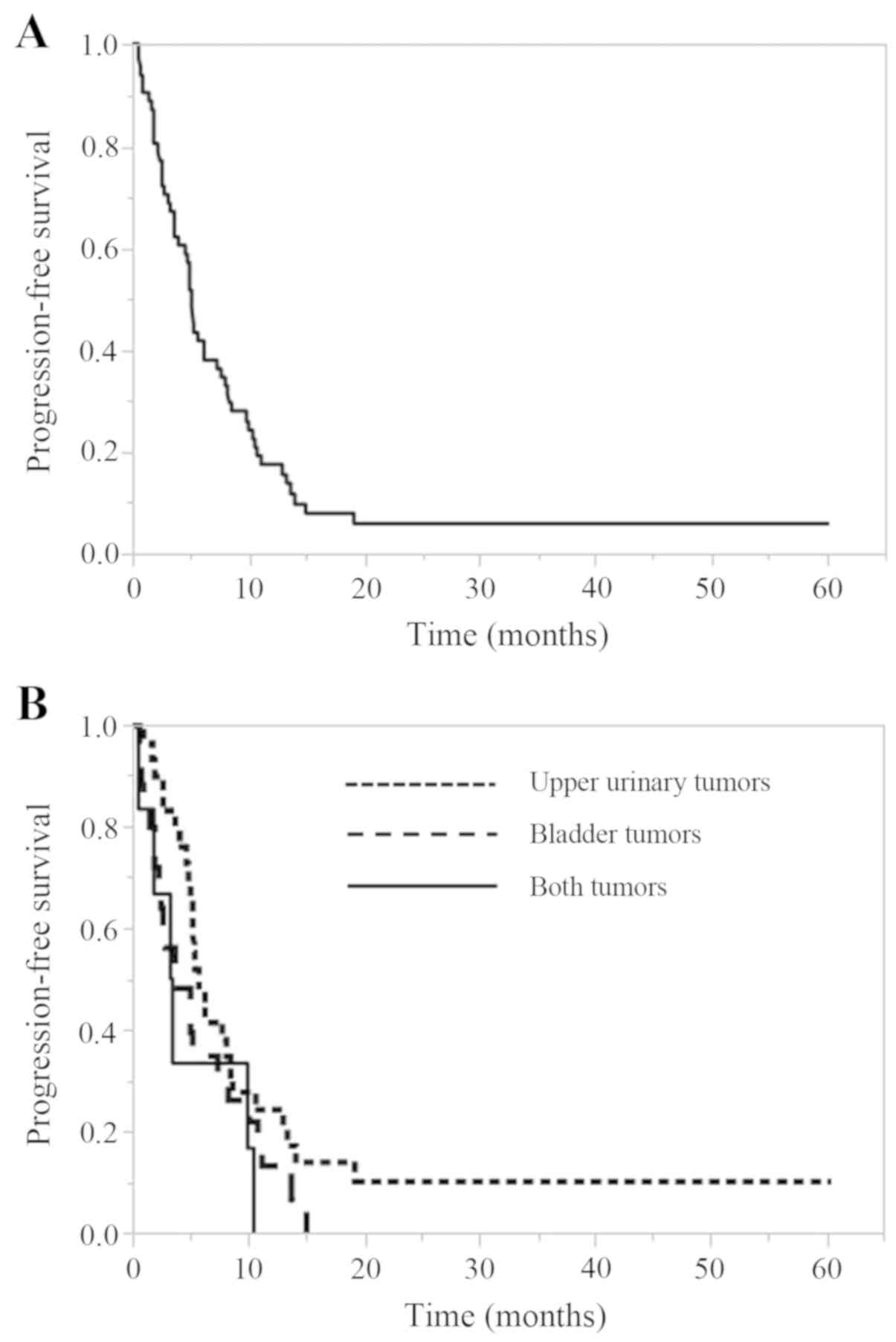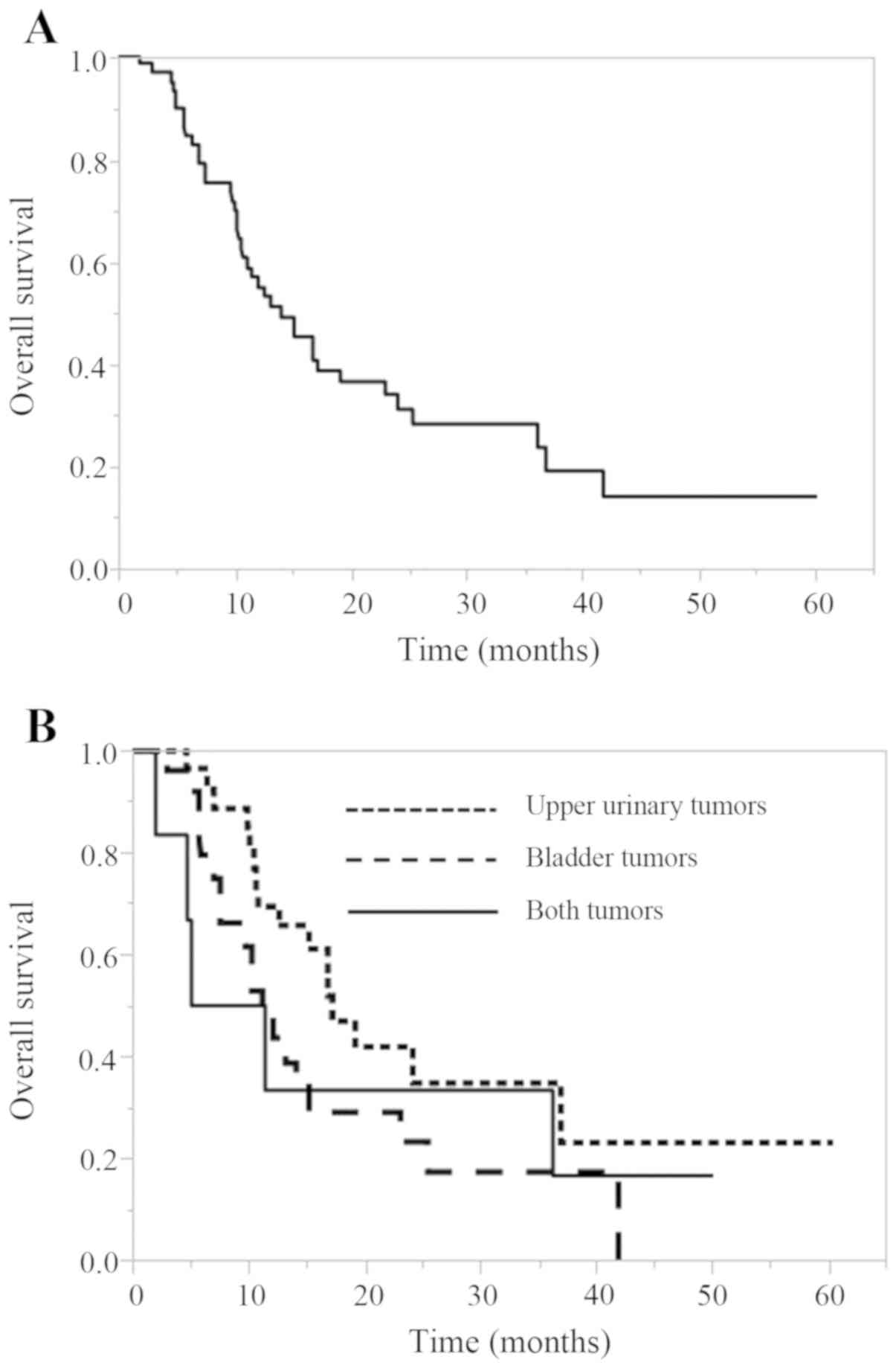|
1
|
Lin T, Liu Z, Liu L, Yang L, Han P, Zhang
P and Wei Q: Prospective evaluation of fluorescence in situ
hybridization for diagnosing urothelial carcinoma. Oncol Lett.
13:3928–3934. 2017. View Article : Google Scholar : PubMed/NCBI
|
|
2
|
Niegisch G, Gerullis H, Lin SW, Pavlova J,
Gondos A, Rudolph A, Haas G, Hennies N and Kramer MW: A real-world
data study to evaluate treatment patterns, clinical characteristics
and survival outcomes for first- and second-line treatment in
locally advanced and metastatic urothelial cancer patients in
Germany. J Cancer. 9:1337–1348. 2018. View Article : Google Scholar : PubMed/NCBI
|
|
3
|
Nakagawa T, Taguchi S, Kanatani A, Kawai
T, Ikeda M, Urakami S, Matsumoto A, Komemushi Y, Miyakawa J, Yamada
D, et al: Oncologic outcome of metastasectomy for urothelial
carcinoma: Who is the best candidate? Ann Surg Oncol. 24:2794–2800.
2017. View Article : Google Scholar : PubMed/NCBI
|
|
4
|
Bellmunt J, de Wit R, Vaughn DJ, Fradet Y,
Lee JL, Fong L, Vogelzang NJ, Climent MA, Petrylak DP, Choueiri TK,
et al: Pembrolizumab as second-line therapy for advanced urothelial
carcinoma. N Engl J Med. 376:1015–1026. 2017. View Article : Google Scholar : PubMed/NCBI
|
|
5
|
Yuasa T, Urakami S and Yonese J: Recent
advances in medical therapy for metastatic urothelial cancer. Int J
Clin Oncol. 23:599–607. 2018. View Article : Google Scholar : PubMed/NCBI
|
|
6
|
von der Maase H, Sengelov L, Roberts JT,
Ricci S, Dogliotti L, Oliver T, Moore MJ, Zimmermann A and Arning
M: Long-term survival results of a randomized trial comparing
gemcitabine plus cisplatin, with methotrexate, vinblastine,
doxorubicin, plus cisplatin in patients with bladder cancer. J Clin
Oncol. 23:4602–4608. 2005. View Article : Google Scholar : PubMed/NCBI
|
|
7
|
Sternberg CN, de Mulder P, Schornagel JH,
Theodore C, Fossa SD, van Oosterom AT, Witjes JA, Spina M, van
Groeningen CJ, Duclos B, et al: Seven year update of an EORTC phase
III trial of high-dose intensity M-VAC chemotherapy and G-CSF
versus classic M-VAC in advanced urothelial tract tumours. Eur J
Cancer. 42:50–54. 2006. View Article : Google Scholar : PubMed/NCBI
|
|
8
|
Saxman SB, Propert KJ, Einhorn LH,
Crawford ED, Tannock I, Raghavan D, Loehrer PJ Sr and Trump D:
Long-term follow-up of a phase III intergroup study of cisplatin
alone or in combination with methotrexate, vinblastine, and
doxorubicin in patients with metastatic urothelial carcinoma: A
cooperative group study. J Clin Oncol. 15:2564–2569. 1997.
View Article : Google Scholar : PubMed/NCBI
|
|
9
|
Bellmunt J, von der Maase H, Mead GM,
Skoneczna I, De Santis M, Daugaard G, Boehle A, Chevreau C,
Paz-Ares L, Laufman LR, et al: Randomized phase III study comparing
paclitaxel/cisplatin/gemcitabine and gemcitabine/cisplatin in
patients with locally advanced or metastatic urothelial cancer
without prior systemic therapy: EORTC intergroup study 30987. J
Clin Oncol. 30:1107–1113. 2012. View Article : Google Scholar : PubMed/NCBI
|
|
10
|
von der Maase H, Hansen SW, Roberts JT,
Dogliotti L, Oliver T, Moore MJ, Bodrogi I, Albers P, Knuth A,
Lippert CM, et al: Gemcitabine and cisplatin versus methotrexate,
vinblastine, doxorubicin, and cisplatin in advanced or metastatic
bladder cancer: Results of a large, randomized, multinational,
multicenter, phase III study. J Clin Oncol. 18:3068–3077. 2000.
View Article : Google Scholar : PubMed/NCBI
|
|
11
|
Moch H, Cubilla AL, Humphrey PA, Reuter VE
and Ulbright TM: The 2016 WHO classification of tumours of the
urinary system and male genital organs-part A: Renal, penile and
testicular tumours. Eur Urol. 70:93–105. 2016. View Article : Google Scholar : PubMed/NCBI
|
|
12
|
Merchan JR: Chemotherapy-related
nephrotoxicity and dose modification n patients with renal
insufficiency. UpToDate. Post TW: UpToDate; 2016
|
|
13
|
The Japanese Society of Nephrology and
Pharmacotherapy. http://jsnp.org/July 15–2019
|
|
14
|
http://ctep.cancer.gov/protocolDevelopment/electronic_applications/ctc.htm#ctc_40
|
|
15
|
Eisenhauer EA, Therasse P, Bogaerts J,
Schwartz LH, Sargent D, Ford R, Dancey J, Arbuck S, Gwyther S,
Mooney M, et al: New response evaluation criteria in solid tumours:
Revised RECIST guideline (version 1.1). Eur J Cancer. 45:228–247.
2009. View Article : Google Scholar : PubMed/NCBI
|
|
16
|
National Comprehensive Cancer Network:
Guidelines on bladder cancer. 2019 Jun 1. https://www.nccn.org/professionals/physician_gls/pdf/bladder.pdf
|
|
17
|
European Association of Urology:
Guidelines on bladder cancer. 2019 Jun 1. https://uroweb.org/guideline/bladder-cancer-muscle-invasive-and-metastatic/
|
|
18
|
Hodi FS, ODay SJ, McDermott DF, Weber RW,
Sosman JA, Haanen JB, Gonzalez R, Robert C, Schadendorf D, Hassel
JC, et al: Improved survival with ipilimumab in patients with
metastatic melanoma. N Engl J Med. 363:711–723. 2010. View Article : Google Scholar : PubMed/NCBI
|
|
19
|
Larkin J, Chiarion-Sileni V, Gonzalez R,
Grob JJ, Cowey CL, Lao CD, Schadendorf D, Dummer R, Smylie M,
Rutkowski P, et al: Combined nivolumab and ipilimumab or
monotherapy in untreated melanoma. N Engl J Med. 373:23–34. 2015.
View Article : Google Scholar : PubMed/NCBI
|
|
20
|
Brahmer J, Reckamp KL, Baas P, Crinò L,
Eberhardt WE, Poddubskaya E, Antonia S, Pluzanski A, Vokes EE,
Holgado E, et al: Nivolumab versus Docetaxel in advanced
squamous-cell non-small-cell lung cancer. N Engl J Med.
373:123–135. 2015. View Article : Google Scholar : PubMed/NCBI
|
|
21
|
Borghaei H, Paz-Ares L, Horn L, Spigel DR,
Steins M, Ready NE, Chow LQ, Vokes EE, Felip E, Holgado E, et al:
Nivolumab versus Docetaxel in advanced nonsquamous non-small-cell
lung cancer. N Engl J Med. 373:1627–1639. 2015. View Article : Google Scholar : PubMed/NCBI
|
|
22
|
Motzer RJ, Escudier B, McDermott DF,
George S, Hammers HJ, Srinivas S, Tykodi SS, Sosman JA, Procopio G,
Plimack ER, et al: Nivolumab versus everolimus in advanced
renal-cell carcinoma. N Engl J Med. 373:1803–1813. 2015. View Article : Google Scholar : PubMed/NCBI
|
|
23
|
De Santis M, Bellmunt J, Mead G, Kerst JM,
Leahy M, Maroto P, Gil T, Marreaud S, Daugaard G, Skoneczna I, et
al: Randomized phase II/III trial assessing gemcitabine/carboplatin
and methotrexate/carboplatin/vinblastine in patients with advanced
urothelial cancer who are unfit for cisplatin-based chemotherapy:
EORTC study 30986. J Clin Oncol. 30:191–196. 2012. View Article : Google Scholar : PubMed/NCBI
|
|
24
|
Balar AV, Galsky MD, Rosenberg JE, Powles
T, Petrylak DP, Bellmunt J, Loriot Y, Necchi A, Hoffman-Censits J,
Perez-Gracia JL, et al: Atezolizumab as first-line treatment in
cisplatin-ineligible patients with locally advanced and metastatic
urothelial carcinoma: A single-arm, multicentre, phase 2 trial.
Lancet. 389:67–76. 2017. View Article : Google Scholar : PubMed/NCBI
|
|
25
|
Balar AV, Castellano D, ODonnell PH,
Grivas P, Vuky J, Powles T, Plimack ER, Hahn NM, de Wit R, Pang L,
et al: First-line pembrolizumab in cisplatin-ineligible patients
with locally advanced and unresectable or metastatic urothelial
cancer (KEYNOTE-052): A multicentre, single-arm, phase 2 study.
Lancet Oncol. 18:1483–1492. 2017. View Article : Google Scholar : PubMed/NCBI
|
|
26
|
Galsky MD, Hahn NM, Rosenberg J, Sonpavde
G, Hutson T, Oh WK, Dreicer R, Vogelzang N, Sternberg CN, Bajorin
DF and Bellmunt J: Treatment of patients with metastatic urothelial
cancer ‘unfit’ for Cisplatin-based chemotherapy. J Clin Oncol.
29:2432–2438. 2011. View Article : Google Scholar : PubMed/NCBI
|
|
27
|
Sonpavde GP, Mariani L, Lo Vullo S, Raggi
D, Giannatempo P, Bamias A, Crabb SJ, Bellmunt J, Yu EY, Niegisch
G, et al: Impact of the number of cycles of platinum based first
line chemotherapy for advanced urothelial carcinoma. J Urol.
200:1207–1214. 2018. View Article : Google Scholar : PubMed/NCBI
|
|
28
|
Chovanec M, Abu Zaid M, Hanna N, El-Kouri
N, Einhorn LH and Albany C: Long-term toxicity of cisplatin in
germ-cell tumor survivors. Ann Oncol. 28:2670–2679. 2017.
View Article : Google Scholar : PubMed/NCBI
|
|
29
|
Seng S, Liu Z, Chiu SK, Proverbs-Singh T,
Sonpavde G, Choueiri TK, Tsao CK, Yu M, Hahn NM, Oh WK and Galsky
MD: Risk of venous thromboembolism in patients with cancer treated
with Cisplatin: A systematic review and meta-analysis. J Clin
Oncol. 30:4416–4426. 2012. View Article : Google Scholar : PubMed/NCBI
|
|
30
|
Dwary AD, Master S, Patel A, Cole C,
Mansour R, Mills G, Koshy N, Peddi P, Burton G, Hammoud D and
Beedupalli K: Excellent response to chemotherapy post
immunotherapy. Oncotarget. 8:91795–91802. 2017. View Article : Google Scholar : PubMed/NCBI
|
|
31
|
Alsuwaigh R, Lee J, Chan G, Chee CE and
Choo SP: Response to targeted therapy or chemotherapy following
immunotherapy in patients with gastrointestinal cancers-a case
series. J Immunother Cancer. 27:1622019. View Article : Google Scholar
|
|
32
|
Ohtsukasa S, Okabe S, Yamashita H, Iwai T
and Sugihara K: Increased expression of CEA and MHC class I in
colorectal cancer cell lines exposed to chemotherapy drugs. J
Cancer Res Clin Oncol. 129:719–726. 2003. View Article : Google Scholar : PubMed/NCBI
|
|
33
|
Wan S, Pestka S, Jubin RG, Lyu YL, Tsai YC
and Liu LF: Chemotherapeutics and radiation stimulate MHC class I
expression through elevated interferon-beta signaling in breast
cancer cells. PLoS One. 7:e325422012. View Article : Google Scholar : PubMed/NCBI
|
|
34
|
Suzuki E, Kapoor V, Jassar AS, Kaiser LR
and Albelda SM: Gemcitabine selectively eliminates splenic
Gr-1+/CD11b+ myeloid suppressor cells in tumor-bearing animals and
enhances antitumor immune activity. Clin Cancer Res. 11:6713–6721.
2005. View Article : Google Scholar : PubMed/NCBI
|
|
35
|
Ghiringhelli F, Larmonier N, Schmitt E,
Parcellier A, Cathelin D, Garrido C, Chauffert B, Solary E,
Bonnotte B and Martin F: CD4+CD25+ regulatory T cells suppress
tumor immunity but are sensitive to cyclophosphamide which allows
immunotherapy of established tumors to be curative. Eur J Immunol.
34:336–344. 2004. View Article : Google Scholar : PubMed/NCBI
|
|
36
|
Marchioni M, Cindolo L, Autorino R,
Primiceri G, Arcaniolo D, De Sio M and Schips L: High
Neutrophil-to-lymphocyte ratio as prognostic factor in patients
affected by upper tract urothelial cancer: A systematic review and
Meta-analysis. Clin Genitourin Cancer. 15:343–349.e1. 2017.
View Article : Google Scholar : PubMed/NCBI
|
|
37
|
Li X, Ma X, Tang L, Wang B, Chen L, Zhang
F and Zhang X: Prognostic value of neutrophil-to-lymphocyte ratio
in urothelial carcinoma of the upper urinary tract and bladder: A
systematic review and meta-analysis. Oncotarget. 8:62681–62692.
2016.PubMed/NCBI
|
|
38
|
Wu S, Zhao X, Wang Y, Zhong Z, Zhang L,
Cao J, Ai K and Xu R: Pretreatment Neutrophil-Lymphocyte ratio as a
predictor in bladder cancer and metastatic or unresectable
urothelial carcinoma patients: A pooled analysis of comparative
studies. Cell Physiol Biochem. 46:1352–1364. 2018. View Article : Google Scholar : PubMed/NCBI
|
|
39
|
Faria SS, Fernandes PC Jr, Silva MJ, Lima
VC, Fontes W, Freitas-Junior R, Eterovic AK and Forget P: The
neutrophil-to-lymphocyte ratio: A narrative review.
Ecancermedicalscience. 10:7022016.PubMed/NCBI
|
|
40
|
Sacdalan DB, Lucero JA and Sacdalan DL:
Prognostic utility of baseline neutrophil-to-lymphocyte ratio in
patients receiving immune checkpoint inhibitors: A review and
meta-analysis. Onco Targets Ther. 11:955–965. 2018. View Article : Google Scholar : PubMed/NCBI
|
















